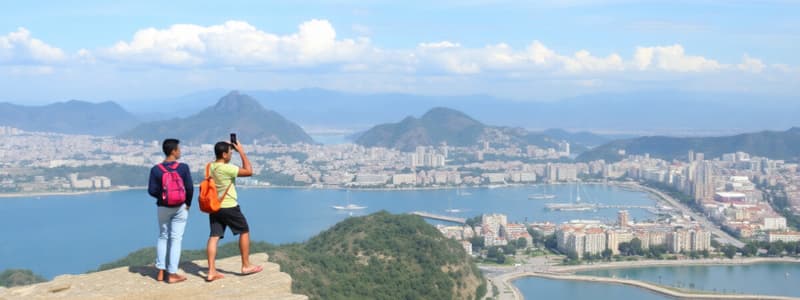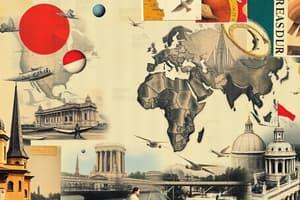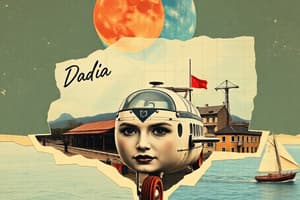Podcast
Questions and Answers
What distinguishes tourism from travel?
What distinguishes tourism from travel?
Which of the following best describes the UNWTO definition of tourism?
Which of the following best describes the UNWTO definition of tourism?
In terms of duration, how do tourists typically differ from travelers?
In terms of duration, how do tourists typically differ from travelers?
Which aspect relates to the planning of travel compared to tourism?
Which aspect relates to the planning of travel compared to tourism?
Signup and view all the answers
Which of the following is NOT a characteristic of tourism?
Which of the following is NOT a characteristic of tourism?
Signup and view all the answers
What is the primary purpose of traveling as opposed to tourism?
What is the primary purpose of traveling as opposed to tourism?
Signup and view all the answers
How has the nature of travel changed over the past 100 years?
How has the nature of travel changed over the past 100 years?
Signup and view all the answers
What does the origin of the word 'Tourism' relate to?
What does the origin of the word 'Tourism' relate to?
Signup and view all the answers
Which aspect is emphasized in the guest perspective of hospitality?
Which aspect is emphasized in the guest perspective of hospitality?
Signup and view all the answers
What is a primary challenge faced by the hospitality industry due to increased demand?
What is a primary challenge faced by the hospitality industry due to increased demand?
Signup and view all the answers
How does technology contribute to hospitality services?
How does technology contribute to hospitality services?
Signup and view all the answers
What best describes the relationship between tourism and hospitality?
What best describes the relationship between tourism and hospitality?
Signup and view all the answers
Which of the following is NOT a component of tourism and hospitality?
Which of the following is NOT a component of tourism and hospitality?
Signup and view all the answers
What is one of the main roles of the food and beverage sector in tourism?
What is one of the main roles of the food and beverage sector in tourism?
Signup and view all the answers
What does the operator perspective in hospitality focus on?
What does the operator perspective in hospitality focus on?
Signup and view all the answers
Which hospitality service is NOT specifically mentioned as catering to tourism?
Which hospitality service is NOT specifically mentioned as catering to tourism?
Signup and view all the answers
What is the primary focus of commercial food services?
What is the primary focus of commercial food services?
Signup and view all the answers
Which of the following is classified as non-commercial food services?
Which of the following is classified as non-commercial food services?
Signup and view all the answers
Which type of service involves the presentation and serving of food at events like weddings and conferences?
Which type of service involves the presentation and serving of food at events like weddings and conferences?
Signup and view all the answers
Which of the following is NOT a type of lodging establishment?
Which of the following is NOT a type of lodging establishment?
Signup and view all the answers
What primary target market is focused on recreational activities and lodging?
What primary target market is focused on recreational activities and lodging?
Signup and view all the answers
Which category of recreation includes activities like sports, hiking, and swimming?
Which category of recreation includes activities like sports, hiking, and swimming?
Signup and view all the answers
What service connects tourists with destinations and enhances their travel experience?
What service connects tourists with destinations and enhances their travel experience?
Signup and view all the answers
Which of the following types of food is NOT mentioned as popular in the Philippines?
Which of the following types of food is NOT mentioned as popular in the Philippines?
Signup and view all the answers
What is a characteristic of the tourist product?
What is a characteristic of the tourist product?
Signup and view all the answers
Which of the following components is NOT typically included in a package tour?
Which of the following components is NOT typically included in a package tour?
Signup and view all the answers
What is the primary role of tour operators?
What is the primary role of tour operators?
Signup and view all the answers
Which of the following factors is NOT one of the three basic factors affecting the success of a tourist destination?
Which of the following factors is NOT one of the three basic factors affecting the success of a tourist destination?
Signup and view all the answers
What defines independent tours?
What defines independent tours?
Signup and view all the answers
How is tourism generally described in terms of its industry characteristics?
How is tourism generally described in terms of its industry characteristics?
Signup and view all the answers
Which of the following is NOT considered a tourist service?
Which of the following is NOT considered a tourist service?
Signup and view all the answers
What influences the characteristics of tourism and hospitality industries?
What influences the characteristics of tourism and hospitality industries?
Signup and view all the answers
What is the primary purpose of the component 'Attraction' in tourism?
What is the primary purpose of the component 'Attraction' in tourism?
Signup and view all the answers
According to Burkart and Medik's definition, which of the following is NOT a characteristic of tourism?
According to Burkart and Medik's definition, which of the following is NOT a characteristic of tourism?
Signup and view all the answers
What do the 'Amenities' in tourism refer to?
What do the 'Amenities' in tourism refer to?
Signup and view all the answers
Which of the following perspectives does NOT focus on individual travelers?
Which of the following perspectives does NOT focus on individual travelers?
Signup and view all the answers
What are the two elements of tourism, as defined by Burkart and Medik?
What are the two elements of tourism, as defined by Burkart and Medik?
Signup and view all the answers
Why has tourism become a unique phenomenon according to Guyer and Feuler?
Why has tourism become a unique phenomenon according to Guyer and Feuler?
Signup and view all the answers
Which component of tourism ensures that tourists can reach their desired destinations?
Which component of tourism ensures that tourists can reach their desired destinations?
Signup and view all the answers
Which group is primarily responsible for providing services that enhance the tourism experience?
Which group is primarily responsible for providing services that enhance the tourism experience?
Signup and view all the answers
Study Notes
Travel vs. Tourism
- Travel is simply the movement of people to a destination
- Tourism is a more specific term, referring to the movement of people for the purpose of leisure or pleasure.
Tourism Defined
- Tourism encompasses various social, cultural, and economic aspects.
- Tourism is a phenomenon that was not common until the development of cheaper and efficient forms of mass transportation.
- The UNWTO (World Tourism Organization) defines tourism as the movement of people to countries or places outside their usual environment for personal or business purposes, including activities related to their stay.
- Other definitions emphasize the temporary nature of tourism, focusing on stays outside of one's usual environment for leisure or recreation.
Components of Tourism
- Attractions: The most vital component of tourism, as they are the main reason people travel to a destination.
- Accessibility: This refers to how easily a destination can be reached, including transportation options.
- Accommodation: Comfortable places to stay, including hotels, resorts, and more, offering food and shelter.
- Amenities: Extra conveniences that enhance the tourist experience, like room service, spas, and hot tubs.
- Activities: Entertainment, leisure, and cultural experiences available for tourists.
Four Perspectives of Tourism
- The Tourist: The individual traveler seeking leisure, business, or other reasons to travel.
- The Business Provider: Companies offering accommodations, transportation, entertainment, and other services.
- The Government: Local and national authorities that promote and regulate tourism.
- The Host Community: The local people and organizations who interact with and are affected by tourism.
Hospitality Defined
- Hospitality refers to the welcoming and generous treatment of guests, including providing them with food, lodging, and entertainment.
Three Perspectives of Hospitality
- The Guest Perspective: Focuses on meeting the expectations of the guest and ensuring they feel comfortable and well-served.
- The Operator Perspective: The operator's primary role is to serve the guest and ensure they feel comfortable and well-catered to.
- The Tech Perspective: Addresses the increasing demand for tourism and hospitality services and explores how technology can address challenges like long lines and shortages of resources.
Relationship between Tourism and Hospitality
- Tourism and hospitality are closely interlinked, with hospitality serving as the primary supplier of products for tourists.
- Hospitality providers include accommodation, transportation, food and beverage services, and leisure activities, all of which contribute to a positive tourist experience.
Components of Tourism and Hospitality
- Food and Beverage Services: Restaurants, cafes, and catering services cater to diverse food preferences.
- Accommodation or Lodging Services: Hotels, resorts, and other lodging provide comfortable places to stay.
- Leisure and Recreation Services: Entertainment, physical activities, cultural experiences, and other recreational pursuits.
- Tourism Services: Transportation, organized tours, travel agents, tour operators, and other services that facilitate travel.
Features of Tourism and Hospitality
- Products are not brought to the consumer: Tourists travel to the location of the product.
- Products are not used up: Tourist experiences, like a hotel room, can be used by multiple individuals.
- Labor intensive: The industry relies heavily on human resources.
- Multi-dimensional phenomenon: Tourism encompasses various social, economic, and cultural factors.
- People-oriented: Providing service and experiences for people is core to the tourism industry.
- Seasonal: Tourist activity tends to fluctuate based on the time of year.
- Dynamic: The tourism industry is constantly evolving and adapting to new trends.
Importance of Tourism and Hospitality
- Tourism and hospitality are significant global industries contributing to economic development and providing various job opportunities.
Studying That Suits You
Use AI to generate personalized quizzes and flashcards to suit your learning preferences.
Related Documents
Description
Explore the key differences between travel and tourism in this quiz. Learn about the definitions, components, and significance of tourism in a social and economic context. Perfect for those interested in the dynamics of travel.




